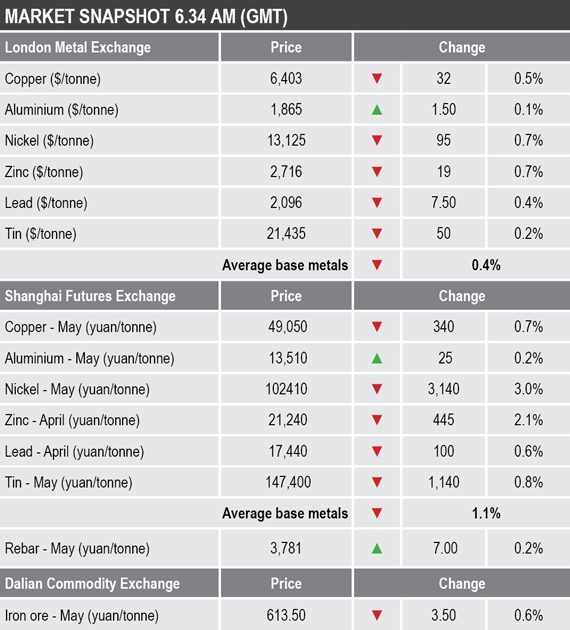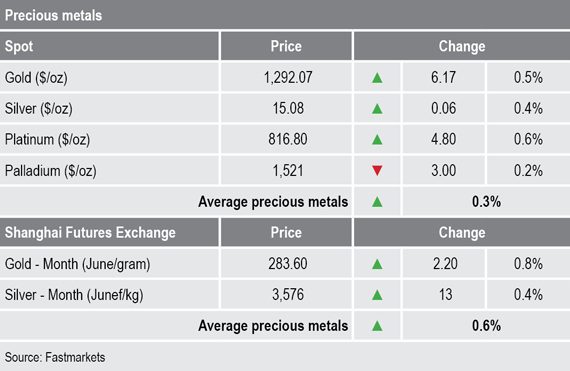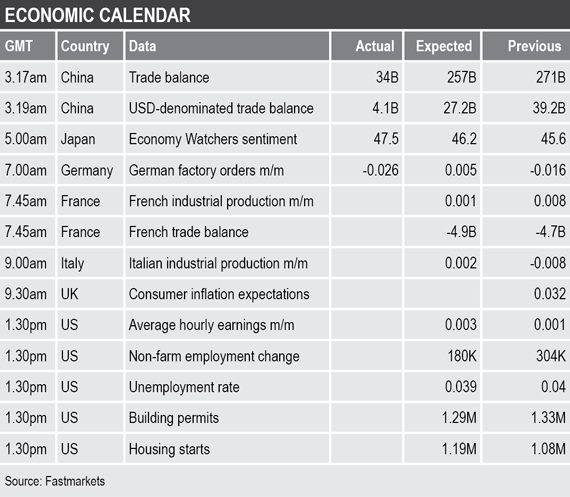With the exception of aluminium that was up by 0.1%, the rest of the complex were down between 0.2% for tin and 0.7% for nickel and zinc. Copper was off by 0.5% at $6,403 per tonne, compared with $6,435 per tonne at Thursday’s close.
Volume was above average with 6,538 lots traded on LME Select as at 06.34am London time, compared with 6,915 lots at a similar time on Thursday.
Spot precious metals prices were for the most part firmer with gold, silver and platinum all up by an average of 0.5%, while palladium was down by 0.2%. Gold was recently quoted at $1,292.07 per oz, compared with $1,285.90 per oz at Thursday’s close – the firm tone in gold suggesting a pick-up in haven demand.
In China, base metals prices on the Shanghai Futures Exchange were for the most part weaker, with the exception of May aluminium that was up by 0.2%. May nickel led on the downside with a 3% drop, followed by a 2.1% drop in April zinc, while the rest were off by an average of 0.7%. May copper was off by 0.7% at 49,050 yuan ($7,306) per tonne recently, compared with 49,390 per tonne at Thursday’s close.
The spot copper price in Changjiang was down by 0.4% at 49,500-49,740 yuan per tonne this morning, compared with 49,675-49,915 yuan per tonne on Thursday, while the London/Shanghai copper arbitrage ratio was firmer at 7.66 after 7.65 at a similar time on Thursday.
In other metals in China, the May iron ore contract on the Dalian Commodity Exchange was down by 0.6% at 613.50 yuan per tonne, compared with 617 yuan per tonne at the close on Thursday. On the SHFE, the May steel rebar contract was up by 0.2% at 3,781 yuan per tonne, compared with 3,774 yuan per tonne at Thursday’s close.
In wider markets, the spot Brent crude oil price was down by 0.64% at $65.62 per barrel, compared with $66.04 per barrel at the close on Thursday.
The yield on US 10-year treasuries was weaker, suggesting a pick-up in risk-off sentiment, it was recently quoted at 2.6280% after 2.6861% at a similar time on Thursday. The yields on the US 2-year and 5-year treasuries remain inverted and were recently quoted at 2.4581% and 2.4235% respectively. The German 10-year bund yield was at 0.0600%, after 0.1200% on Thursday morning.
Asian equity markets were weaker on Friday: Nikkei (-2.01%), Hang Seng (-1.71%), the CSI 300 (-3.92%), the Kospi (-1.31%) and the ASX 200 was firmer (-0.96%).
This follows a weaker performance in western markets on Thursday; in the United States, the Dow Jones Industrial Average closed down by 0.78% at 25,473.23, and in Europe, the Euro Stoxx 50 closed down by 0.48% at 3,308.85.
The dollar index has climbed to challenge the highs from the fourth quarter last year as the European Central Bank measures on Thursday were seen as being more dovish than expected. The dollar index was recently quoted at 97.46, Thursday’s high was 97.72, which just overcame the 2018 peaks from November at 97.70 and December at 97.71. Conversely the euro (1.1207), sterling (1.3090) and the Australian dollar (0.7005), are weaker, while the yen (111.01) is firmer, which is another sign of haven demand.
The yuan is also weaker and was recently quoted at 6.7234 compared with 6.7082 at a similar time on Thursday. Most of the other emerging market currencies we follow are also weakening which is a sign of stress. The exception is the Indian rupee that is stronger.
The economic agenda is busy today, with data already out showing weak Chinese trade numbers for February, but taking January and February together to iron out the Lunar New Year effect showed exports fell 4.6% compared with the same period in 2018, and imports fell 3.1%. German factory orders have also been released, falling 2.6% in January, after a 1.6% fall previously, the data has been negative for the past three readings.
Data on French and Italian industrial production and the French trade balance are still pending, while US releases due on Thursday mainly focus on the monthly employment report but there is also data on housing starts and building permits.
The recent rallies in base metals prices have run out of steam and prices have to varying degrees turned lower. It is still not clear whether this is just a consolidation or whether it is the start of a more meaningful correction. Given the economic news and that the market had been buoyed by optimism that a trade deal was nearing, which has now gone quiet, there may well be more downside risk.
We still feel we are in a race against time before weakening economic data tips a larger part of the global economy into a deeper slowdown, or will a trade deal come about soon enough to instill growth back into the global economy. For now, we watch the extent to which prices can hold up at these relatively high levels – if they struggle then consolidation may turn into another sell-off. Any sudden rise in copper stocks could act as a catalyst.
With other markets looking more strained, with the government bond yields falling and with the yen firmer, there are signs that investors are looking for haven assets again and therefore we are not surprised that gold prices are firmer.



